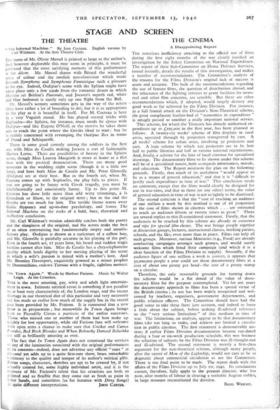THE CINEMA
A Disappointing Report
THE notorious inefficiency attaching to the official use of films during the first eight months of the war clearly justified an investigation by the Select Committee on National Expenditure. The report of their Sub-Committee on Home Defence Services, issued recently, details the results of this investigation, and makes a number of recommendations. The Committee's analysis of the reasons for the Films Division's original lack of success is acute and accurate. The bulk of the recommendations regarding the use of feature films, the question of distribution abroad, and the reluctance of the fighting services to grant facilities for news- reel and other film concerns, are sensible. But there are other recommendations which, if adopted, would largely destroy any good work so far achieved by the Films Division. For instance, in a full frontal attack on the Division's Non-Theatrical scheme, the great complacent feather-bed of ” economics in expenditure " is smugly poised to smother a really important national service.
This scheme, for which the Treasury has already authorised ex- penditure up to 4195,000 in the first year, has been planned as follows. A twenty-six weeks' scheme of film displays in rural areas, operated through 65 projectors transported by cars. A 48 weeks' scheme for urban areas, involving 5o projectors and cars. A loan scheme by which too projectors are to be lent half to public libraries and half to various national organisations. And, finally, a scheme for the hire of local cinemas for specialised showings. The documentary films to be shown under this scheme will be of a specialised nature, both as regards information, morale, and education. The Report mistrusts the plan on the following grounds. Firstly, that much of its usefulness "would appear to be as a means of general education," and that it is " difficult to justify such expenditure in time of war." This conclusion needs no comment, except that the films would dearly be designed for use in war-time, and that in those (or any other) terms, the value of general education in time of war is not so lightly to be dismissed.
The second criticism is that the " cost of reaching an audience of one million a week by this method is out of all proportion to the cost of films shown in cinemas which . . . are estimated to reach an audience fifteen or twenty times as great." There are several replies to this ill-considered statement. Firstly, that the audiences to be reached by this scheme are already in existence and ripe for special film shows. The war brings people together at discussion groups, lectures, instructional classes, working parties, schools, and the like, even more than in peace. Films can help all such groups. Moreover, various Ministries (e.g., Food) are already conducting campaigns amongst such groups, and would surely welcome films which fitted their campaign (and which it is a clear function of the Films Division to supply). Secondly, if the audience figure of one million a week is correct, it appears that 52,000,000 people a year could see these documentary films at a cost of about one penny per head—the cost of a penny stamp on a circular.
Therefore, the only reasonable grounds for turning down the scheme would be a flat denial of the value of docu- mentary films for the purpose contemplated. Yet for ten years the documentary approach to films has been a special virtue of the British cinema ; its use has been widely recognised and wel- comed by teachers, organisers, government departments, and public relations officers. The Committee should have had the good sense to take these facts into account, and indeed to learn a little about the subject, before making ill-advised reference to the " very serious limitations " of this medium in time of war. The limitations, on analysis, appear to be that documentary films take too long to make, and achieve too limited a circula- tion in public cinemas. The first statement is demonstrably un- true; if earlier Films Division documentaries became out-dated during a four or six-week production schedule, this was because the selection of subjects by the Films Division was ill-thought-out and till-advised. The second statement is merely a first-class argument for the non-theatrical scheme, although many people, after the career of Men of the Lightship, would not care to be as dogmatic about commercial circulation as are the Committee. There is one final point to be made. The report deals with the affairs of the Films Division up to July 1st, too. Its conclusions cannot, therefore, fully apply to the present director, who has now, after months of labour in clearing a veritable Augean stables, in large measure reconstituted the division.
BASIL WRIGHT.


























 Previous page
Previous page